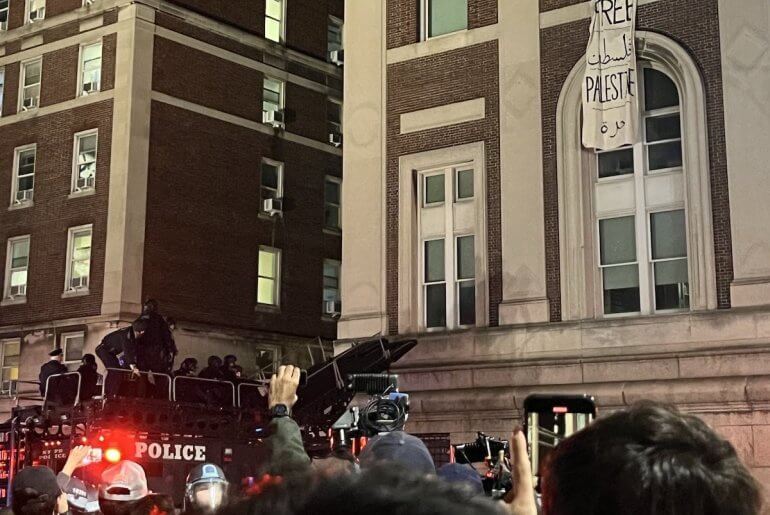On September 13, 1993, Israeli Prime Minister Yitzhak Rabin and Palestine Liberation Organization (PLO) Negotiator Mahmoud Abbas signed the Declaration of Principles on Interim Self-Government Arrangements, more commonly known as the first Oslo Accords. Following the signing of the agreement, Rabin and PLO Chairman Yasser Arafat shook hands in front of an elated U.S. President Bill Clinton, creating one of the most well-known photo ops of the past century.
But behind the photo op, a much more sinister picture was playing out on the ground. On paper, the Oslo Accords were meant to kick off a five-year “peace process” and culminate with an end to the so-called “Israeli-Palestinian conflict.” In reality, the accords led to more division, fragmentation, and loss for the Palestinians while giving Israel even more control over the people, land, and resources.
In this report, Mondoweiss sat down with former PLO Executive Committee member Dr. Hanan Ashrawi, Dr. Yara Hawari of Palestinian think tank Al-Shabaka, young activists in Ramallah and Nablus, and resistance fighters in Jenin. From the initial mistakes and flaws made within the agreements, to the disastrous affects on Palestine’s youth, the Palestinians we spoke to reflect on the past 30 years since the first Oslo Accords were signed and all the ways in which the agreement impacted their lives, pushing them even further away from achieving liberation and statehood.
Yumna Patel
Yumna Patel is the Palestine News Director for Mondoweiss.



Yumna’s video was very well done and at the same time very painful for us Palestinians to watch since it documents the betrayal and high treason carried out by Arafat, Abbas and their Fatah toadies since 1993 and even as far back as 1988.
Brent’s comments fail to understand that for a national liberation movement like ours, all forms of struggle must be mastered including armed and militant resistance which has grown in sophistication, scale and frequency. In fact, the armed Palestinian resistance brigades have begun to seriously alarm the Zionst regime’s security establishment, according to frequent stories in Haaretz.
Therefore, his dismissive attitude toward this popular phenomenon is out of place. In this day and age, it is preposterous to expect an occupied, colonized, oppressed people like the Palestinians to not defend themselves against daily military and settler violence and aggression. Does he expect our people to go like sheep to the slaughter?
However, our people, in their unlimited resourcefuless, will continue to use the various tools of civil disobedience and resistance including demonstrations, strikes, boycotts, sabotage and culture to undermine Zionist rule. It is time we ceased second guessing and dictating to the occupied Palestinians how they should resist the Zionist regime and instead support their just struggle in all its forms.
The Oslo Accords were designed as a first step towards a negotiation towards peace, that peace was supposed to be peace with something approaching a state for the Palestinians. This was Rabin’s perspective. (The definition of “not quite a state” is certainly enigmatic to use soft language.)
Rabin’s murder and the second intifada and the period of building up trust crashing on reality, all added up to an utter failure and in its place a temporary machinery (The Palestinian control by Fatah as a middleman of some sort between the Israelis and the population) has been turned into something permanent. It doesn’t work.
The piece did not get deep into it. 1. If two states are dead, let me hear a vision about one state, not from journalists, but from activists on the ground. The idea of coexistence in one state is not emphasized, for they are busy fighting the Zionists, so the concepts are left to the peanut gallery, which ends up as a lack. 2. Gaza was mentioned, but not discussed.
Greater Israel has long operated “by way of deception.” Clearly the power balance is theirs. For Palestinians to achieve liberty and dignity, using power will not work as some youth have come to believe. Confidence in the political approach has been undermined successfully. Now that it is a given the two state solution is not an option, equality in a secular state is the recognized solution.
Throwing rocks at soldiers did not and will not bring success. The political path is now wide open. It can be won via political bridges to humanist Westerners, especially Jews. Greater Israel supremacists cannot stand against equality. If there is a route back to the 2SS, they will find it in self-defense. It’s an open question whether Palestinian nationalists will be able to respect the collective well-being.